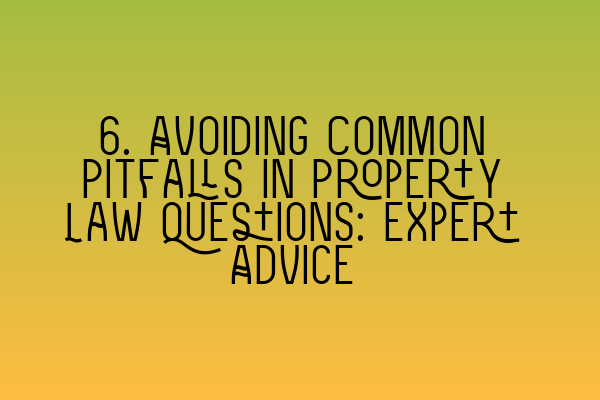6. Avoiding Common Pitfalls in Property Law Questions: Expert Advice
Property law is a complex and multifaceted area of legal practice. Whether you are studying for the SQE exams or working as a property solicitor, it is important to be aware of common pitfalls that can arise when dealing with property law questions. In this article, we will explore six common pitfalls and provide expert advice on how to avoid them.
1. Failure to Consider All Relevant Legislation
One of the most common pitfalls in property law questions is the failure to consider all relevant legislation. Property law is governed by a wide range of statutes and regulations, and it is important to review them thoroughly to ensure you have a comprehensive understanding of the legal framework. Failure to consider all relevant legislation can lead to inaccurate advice and potential legal issues down the line.
Take the time to research and familiarize yourself with the relevant legislation. In particular, pay attention to any recent developments or changes in the law that may impact your analysis. Stay up to date with the latest legal updates and consider enrolling in SQE 2 preparation courses to deepen your understanding of property law.
Related Article: SQE 1 Practice Exam Questions
2. Failure to Conduct Proper Due Diligence
Proper due diligence is essential in property transactions. Failing to conduct thorough due diligence can lead to significant financial and legal consequences. It is important to review all relevant documentation, conduct property searches, and assess any potential risks or liabilities associated with the property.
When answering property law questions, make sure to outline the necessary steps for conducting due diligence. Discuss the importance of reviewing title deeds, obtaining local authority searches, and investigating any potential issues such as planning permissions or environmental concerns. By demonstrating a thorough understanding of due diligence processes, you can provide comprehensive and accurate advice.
3. Lack of Attention to Detail
Property law is notorious for its attention to detail. Failing to pay close attention to the specifics of a property law question can lead to errors and inaccuracies in your analysis. It is crucial to carefully read and analyze the facts provided, identifying any relevant details that may impact your advice.
When faced with a property law question, take the time to break down the facts and identify any relevant legal principles. Make sure to consider all potential interpretations and assess the implications of each. By demonstrating a keen eye for detail, you can provide holistic and accurate advice.
4. Inadequate Communication
Effective communication is vital in property law practice. Failing to communicate clearly and effectively can lead to misunderstandings, disputes, and potential legal liabilities. It is important to convey your advice in a concise and understandable manner, taking care to address any potential pitfalls or gray areas.
When answering property law questions, make sure to structure your response in a logical and organized manner. Clearly outline the relevant legal principles, provide supporting analysis, and conclude with a clear and concise recommendation. By demonstrating strong communication skills, you can effectively convey your expertise and help clients navigate property law challenges.
5. Ignoring Ethical Considerations
Ethical considerations play a significant role in property law practice. Failing to address ethical concerns can lead to professional misconduct and potential legal repercussions. It is important to be aware of the ethical obligations pertaining to property law and incorporate them into your analysis and advice.
When faced with a property law question, consider any potential conflicts of interest, confidentiality requirements, and professional responsibilities. Address these ethical considerations in your analysis and advise accordingly. By demonstrating a strong ethical framework, you can enhance your professional reputation and build client trust.
Related Article: SQE 2 Preparation Courses
6. Insufficient Time Management
Time management is crucial in property law practice. Failing to manage your time effectively can lead to rushed analysis, inaccurate advice, and missed deadlines. It is important to prioritize your tasks, allocate sufficient time for research and analysis, and meet all applicable deadlines.
When answering property law questions, make sure to plan your response and allocate appropriate time for each section. Consider any time-sensitive aspects and ensure you allow enough time to provide thorough and accurate advice. By demonstrating effective time management skills, you can improve your efficiency and deliver high-quality work.
By understanding and avoiding these common pitfalls, you can enhance your performance in property law questions and provide expert advice. Take the time to familiarize yourself with relevant legislation, conduct thorough due diligence, pay attention to detail, communicate effectively, address ethical considerations, and manage your time wisely. With practice and a comprehensive understanding of property law, you can excel in your legal career.
Related Articles:
